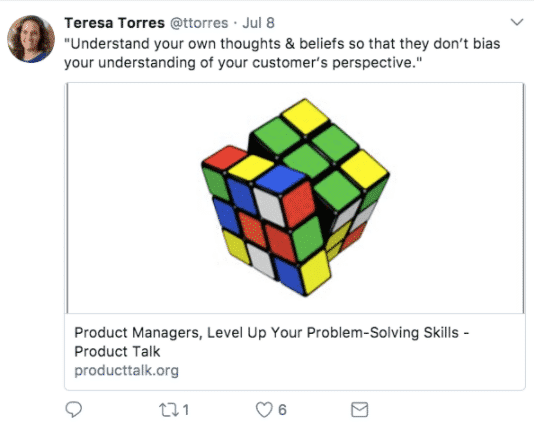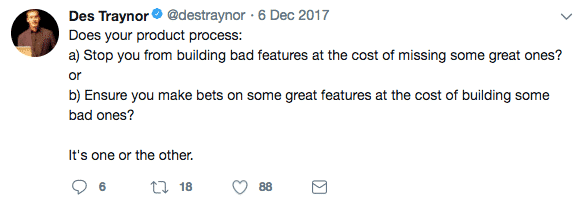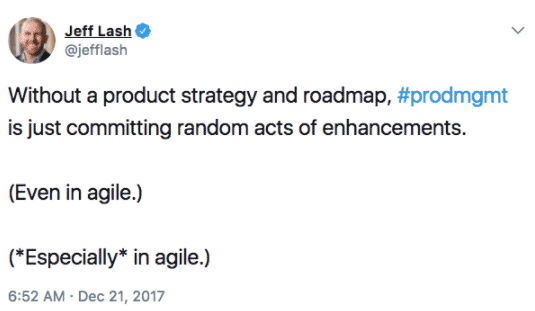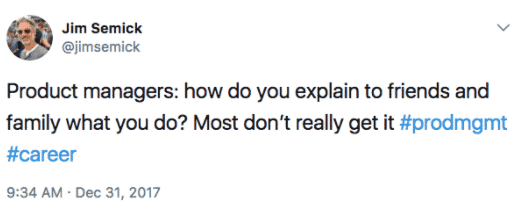At ProductPlan, we’re lucky to work with product managers on a regular basis. One thing we’ve noticed is that product managers are pretty avid consumers of content: books, blogs, podcasts, etc. Often, they’ll distill their learnings and insights from all these sources into 140 (or 280!) characters and tweet it out to the product community. We put together a handful of our favorite product-focused tweets from the past year and included some commentary below. Check them out and let us know which tweets you liked or retweeted this past year!
From @johncutlefish:

We really appreciated this perspective from John Cutler. It offers a great reminder of the unique dynamics of a product manager’s role. Product managers exist in a position where they’re expected to propel the product forward and facilitate progress, but they often don’t have any direct authority over the members of the various teams required to do this kind of work. But product managers are still part of the team. They facilitate. They strategize. These aren’t “pure management” roles and most product managers aren’t writing code or building prototypes themselves, but they produce “the big picture,” the strategy around which the rest of the team can contextualize their work and align their efforts. It’s a unique role, and one that’s worth thinking about from this perspective.
From @ttorres:

This tweet from Teresa Torres really rang true for us this past year. In 2017, a common theme in product management discussions was the idea of bias, assumptions, and misconceptions about the market. Teresa puts it really succinctly here, suggesting that, as a product manager, it’s extremely important to try and check your own bias when you take on your customer’s perspective. That’s not to say you shouldn’t have your own individual thoughts and feelings or instincts. These are, after all, some of the best tools a product manager has to make those tough-to-call decisions when the data, customer interviews, etc., aren’t offering a clear strategic direction.
What Teresa is suggesting, rather, is to stand back and take stock of your own personal biases, or your organization’s biases and assumptions, and approach the development of your customer’s perspectives as objectively as possible. Sure, you might have a hunch about how your customer interacts with the world in their profession, but why not approach an interview or market problem with an open mind. It’s highly likely your customer knows their day-to-day life better than you do and making too many assumptions about it will prevent you from discovering genuinely new insights.
From @lissijean:

Story points are a valuable part of modern software development. They’re a helpful tool to express the estimated complexity and time involved in taking a backlog item from to-do item to usable feature. But, as Melissa Perri points out in this great tweet, story points are not the final product or feature. Your customers aren’t concerned with story points. They’re concerned with how your product helps them move seamlessly through their work and delivering that experience should be your primary focus as a product manager.
At ProductPlan, we often discuss and write about metrics. With all the metrics and tracking available to you throughout the product development process, it’s easy to keep your head down and stay focused on the data. This tweet helps remind us that you’re building products for users, and part of the estimation process for features should involve not just story points (complexity, risk, effort), but also the amount of perceived value item will deliver to your customer.
From @destraynor:

These types of process-oriented questions always present a great opportunity to examine your product management approach. Though it’s obvious there’s a lot of complexity that’s being boiled down here to just two choices, it’s a powerful question: Is your process so risk averse it’s preventing innovation, or is it flexible enough to encourage experiments that might not always pan out but potentially deliver great results? It seems pretty clear that the tweet’s author seems to be leaning toward option B, but it’s also likely that option A will feel familiar to lots of product managers. It’s important to think about the balance between getting good work done, avoiding waste, etc., and holding enough space for discovery, experimentation, and true innovation.
This is a great prompt to think about the way we generally define success and waste, and reminds us that product management is a long-term, strategic process. There will be some short-term ups and downs, bets that pay off and bets that don’t, but product management is about delivering long-term value to customers. Sometimes delivering something truly new and delightful to customers involves taking chances and re-thinking your product process.
From @christianism:

We thought this was a great sentiment. Smart product managers know that their product’s success (as well as their personal professional success) hinges on their ability to work with other teams: designers, engineers, business stakeholders, marketing, sales, etc. As we think more and more about the product in terms of the entire customer experience, this becomes even more crucial. Christian’s tweet boils this complex point about working cross-functionally down to a very practical piece of advice.
As a bonus, the part about speaking to designers and engineers to figure out how to attract great designers and engineers also reminds us of a similar point: we should get out of the office and talk to customers about customer goals, desires, etc. Just like it doesn’t make sense to ask other product managers about how to hire a great UX designer, you’re going to have a difficult time solving your customers problems if you never talk to them directly.
From @jefflash:

“Random acts of enhancements” has to be one of the pithier lines of the year for the #prodmgmt hashtag. Jeff’s tweet does an excellent job of articulating the link between work, strategy, and your product roadmap. Any one of these things on their own is not entirely helpful. If you don’t have a strategy, you’ve got nothing to put on your roadmap and you’re likely going to waste a lot of resources on work that’s not furthering any particular goal. If you have work and strategy, but no roadmap, you’re going to have a difficult time communicating that strategy to your stakeholders and getting their buy-in on how you plan to allocate resources. Bottom line: you need all three.
We also loved the nod to agile, and to the frequency with which the methodology is misunderstood, sometimes even by very experienced product folks. If agile is all about moving frequently, working lean, and regularly shipping new code, then you definitely need a product strategy and a roadmap, otherwise you’re going to be “committing random acts of enhancements” at a faster or more frequent rate than you would in traditional waterfall.
From @jimsemick:

This one’s mostly just for fun. But it’s actually a really interesting prompt to think about product management as a profession, especially as we really break into 2018. It may be that product management is hitting a milestone on its maturation curve as a discipline, but we’re seeing more and more interest in the product manager career path, topics around interviewing, advancing, changing roles, so much so that we recently published a book-length Career Guide for Product Managers.
Though it’s kind of funny to imagine how you explain product management (or UX design or QA engineering) to your in-laws, Jim’s tweet is also a good prompt to think about how you define it for yourself, for your stakeholders, and for the other teams involved in your product process. Which parts of the role do you emphasize the most? Strategy? Metrics? Delivering the product itself? However you explain it to others, take some time this year to reflect and consider how you define product management for yourself.
What were some of your favorite #prodmgmt tweets from 2017? Share them in the comments section below!



